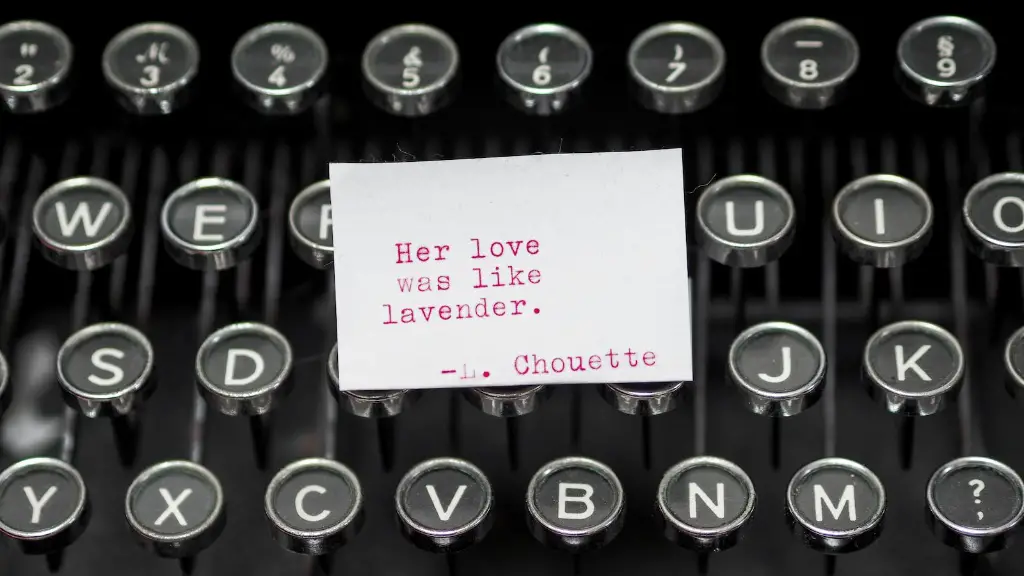The Power of Poetry
Poetry can be a powerful entity, capable of conveying a range of emotions and delivering new perspectives. Through its use of figurative language and dynamic sound techniques, it is often able to present the reader with a different perspective on the world. Whether we’re listening to someone perform the poem, discussing it in a creative writing class, or reading it on the page, there is a certain magic associated with the art of poetry that can make us pause and consider the possibilities of our lives.
But what truly makes a piece of poetry so captivating? What is it about a poem that can captivate an audience and lead them to a deeper understanding of the world around them? To answer this question, we must look to the elements of poetry.
Elements of Poetry
The beauty of poetry is found in its many elements. The use of imagery, alliteration, metaphor, symbols, and other poetic devices can often create an emotional impact on a reader. To create a successful piece of poetry, the poet must be able to craft a story line and communicate their message by utilizing the many facets of the language.
An experienced poet will also often incorporate poetic meter into their work. Meter is used to create a sense of rhythm and sound that make the poem more enjoyable to read. By utilizing a consistent pattern of stressed and unstressed syllables, the poet can create a dramatic effect that pulls the reader in and encourages them to think, feel, and understand the words being spoken.
The use of language can also be an important factor in a poem. Many poets choose to use traditional rhyming patterns, such as end-rhymes and internal rhymes, to make their work stand out. Others, like contemporary poets, may choose to use non-traditional language, such as stream-of-consciousness, found sounds, and even partially invented words to create a unique effect.
Themes in Poetry
In many cases, the themes of the poem are just as important as the language and meter used to create it. Whether the poem is about love, death, nature, or any other experience, a good poem will explore a range of themes in order to give the reader an opportunity to explore the same issues being discussed. By creating vivid imagery that reveal the nuances of the emotions being explored in the poem, a reader can be transported to a different realm of understanding.
No matter the topic of the poem, the poet must be able to craft a piece that is both meaningful and impactful. That being said, it is important to remember that the key is to focus on the emotions evoked by the words and the story being told. By incorporating vivid descriptions, powerful imagery, and innovative language, a poet can create a piece that speaks to their readers.
Appreciation of Poetry
In the modern era, poetry has become a more accessible form of artistic expression and is often seen as an important tool in learning how to appreciate the world around us. Through the power of the written word, poetry can provide us with a new way of looking at our own experiences and of learning to empathize and connect with others, regardless of our differences.
Ultimately, a piece of poetry, once created, can provide readers and listeners with an opportunity to understand and appreciate the power of language and the emotions that can be conveyed through it. Whether we are in awe of the beauty of the language, or moved to tears by a heartfelt story, poetry can give us a new way of interpreting our lives and the world around us.
Analysis of Poetry
In order to truly appreciate a piece of poetry, it is important to be able to analyze the language, meaning, and theme of the work. By looking beyond the superficial elements of the poem, readers can begin to see how language and sound is used to create an emotional experience. It is also possible to pull apart the poem line by line, exploring the words and the way they are used in order to gain a deeper understanding of the poet’s intentions.
Finally, it is important to think about how the poem is impacting the reader. How are they understanding the work? How is the poem affecting them emotionally? By carefully examining the poem both inside and out, it is possible to gain a deeper appreciation of the work.
Connection with Poetry
The ability to connect with a piece of poetry is a special one. By understanding the language, meaning, and themes of the poem, we can see how the poet has chosen to express their emotions and experiences in the world. The connection that can be felt from an emotionally charged piece of poetry can be both powerful and life-changing.
By exercising our emotional intelligence and understanding how to read a poem, we can open up to new experiences and appreciate the beauty of language. Through understanding the power of poetry, we can explore our own emotional lives in order to gain a greater understanding of ourselves and the world around us.
Application of Poetry
The use of poetry is still applicable in many areas of our lives. From performance art to therapy, there are many ways in which poetry can offer us insight into ourselves, our emotions, and our relationships. Many poets turn to the written word in order to explore their feelings and gain clarity in their lives. It has also been used as a form of therapeutic interventions, often giving people an opportunity to express their feelings in a safe and creative way.
In addition, poetry is often utilized in classrooms and theatre to inspire students to think creatively and to gain a better understanding of the world. By using figurative language and sound techniques, poets can provide students with a different perspective on the topics being discussed, allowing them to explore the power of their own ideas.
Ultimately, poetry is still a powerful and meaningful form of expression. By utilizing its elements and understanding the power of language, we can appreciate poetry for what it is and explore its applications in our regular lives.




